RIP, Sidney Poitier!
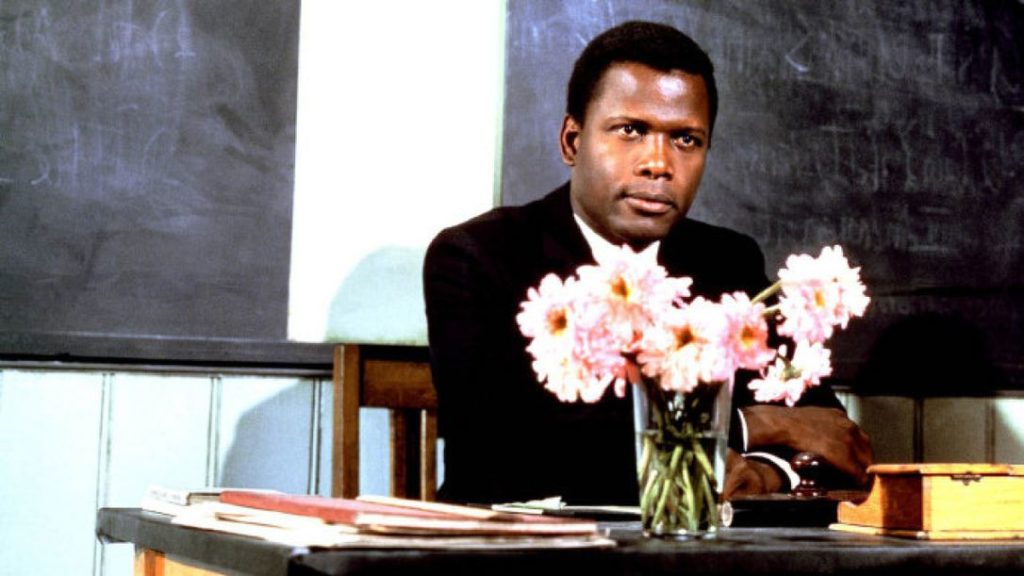
by Madhulika Liddle
When I heard the news of Sidney Poitier’s death (on January 6th, 2022), one of the first thoughts that came to me was: what a sad coincidence, that the last English-language film I’d reviewed on this blog was one of his (The Bedford Incident). Then, the realization that, in so many years of blogging, while I’ve watched and/or reviewed several films of Poitier’s (including the wonderful Lilies of the Field, for which he won an Academy Award; The Long Ships; The Defiant Ones), I’ve never seen a few of his most iconic films, such as In The Heat of the Night, Guess Who’s Coming to Dinner, and A Raisin in The Sun.
I will watch those sometime, sooner or later; but for now, to commemorate the life and career of one of my favourite actors, I decided to rewatch a film I haven’t seen in several decades. The film that’s probably the one with which most Indians (at least) associate Poitier, about a school teacher who manages to change the lives of the disturbed and insecure students he has to teach.
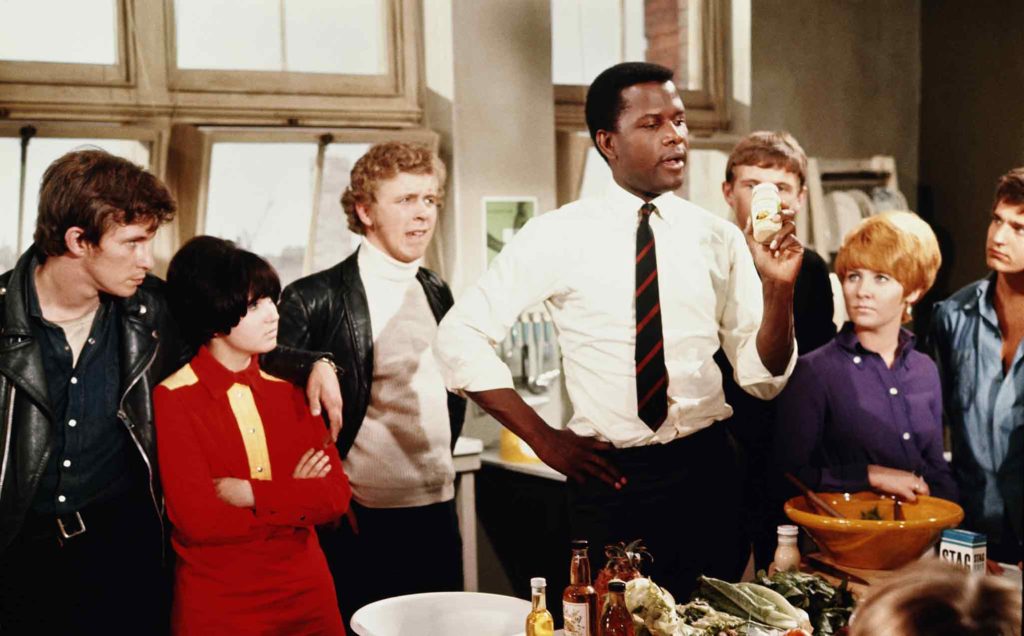
To Sir, With Love begins with British Guiana-born Mark Thackeray making his way to the London Docks area, where he finally arrives at his destination: a shabby school named North Quay. Just as Thackeray goes through the gate, a teenager emerges from the makeshift toilet nearby. Cigarette dangling from his lower lip, he looks insolently at Thackeray, asks (in a rather indistinct drawl) what Thackeray wants, and subsequently goes his way. Not a promising start to this job, Thackeray’s first.
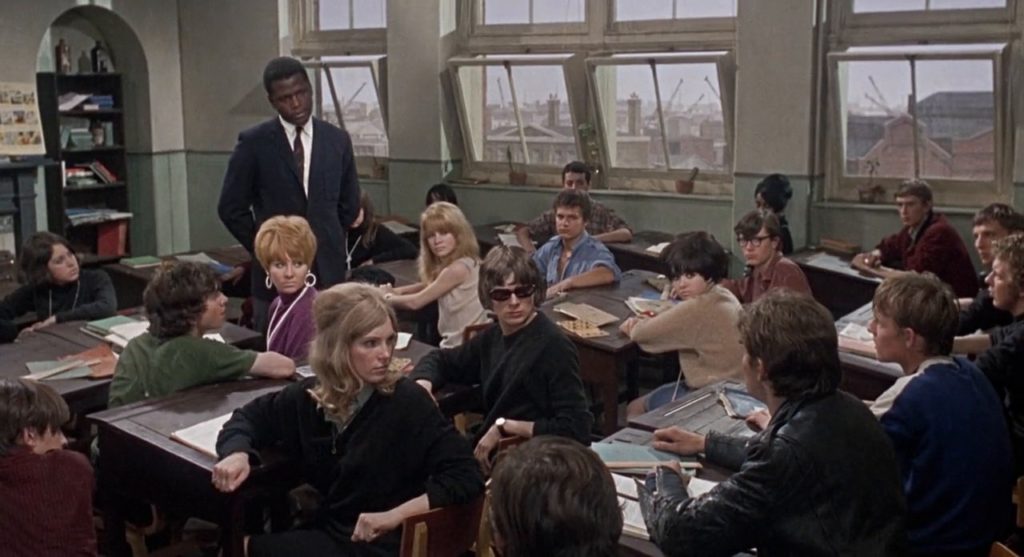
As it turns out, from various conversations over the next few scenes, Thackeray is a qualified engineer, and has been driven to taking up this job as a teacher only after several unsuccessful attempts at finding work as an engineer. A man who has no experience teaching: how will he manage here, in this school? From that brief meeting outside the toilet in the yard, to a quick glimpse inside a noisy classroom, Thackeray has got at least a hint of just how unruly these ‘kids’ (as everybody calls them) can be.
In the staff room, Thackeray soon meets the other teachers, and gets further insights into the school, the students, and the teachers. Theo Weston (Geoffrey Bayldon), for instance, is utterly cynical and of the opinion that nothing will improve these students. They’re from the dregs of society, the very worst, and nothing anybody does will be able to stop them getting out of school only to take up a life of crime or poverty or both.
In the staff room, Thackeray soon meets the other teachers, and gets further insights into the school, the students, and the teachers. Theo Weston (Geoffrey Bayldon), for instance, is utterly cynical and of the opinion that nothing will improve these students. They’re from the dregs of society, the very worst, and nothing anybody does will be able to stop them getting out of school only to take up a life of crime or poverty or both.
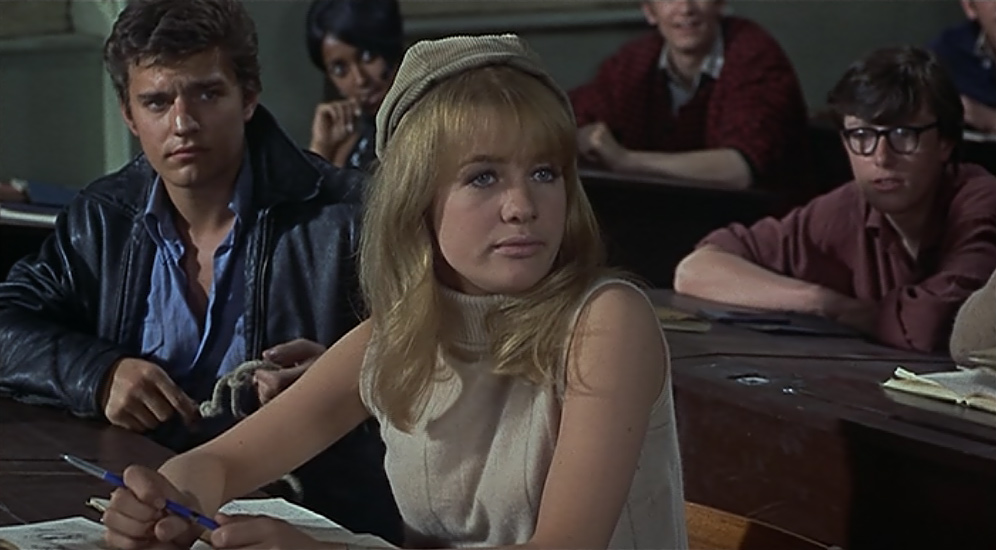
In the meantime, though, Thackeray must learn to deal with the students in his charge. These young people come from very poor backgrounds, as the head master Florian (Edward Burnham) explains. He seems to be somewhat resigned to doing what they must to get this lot through school and out; do nothing to rock the boat, but do nothing to make a difference, seems to be the motto here.
And, as soon as he enters his classroom, Thackeray realizes just what he’s let himself in for. This group of teenagers seems to be uniformly slovenly, foul-mouthed, and rough. They are brazen in the way they lounge around in class, either slouching or sitting back insolently. They jeer, they pass provoking comments, they make it clear to Thackeray that they don’t care.
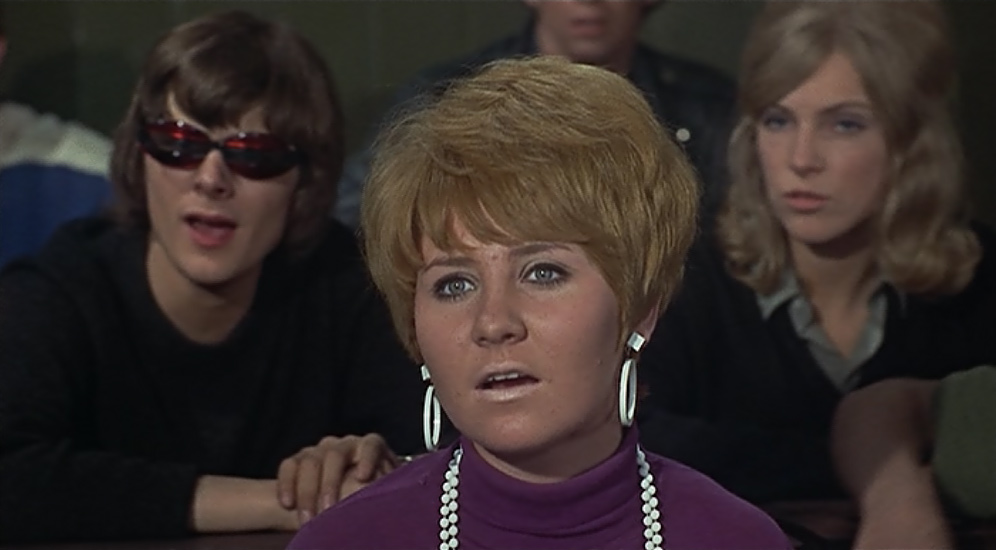
Denham (Christian Roberts) is the worst of the lot: hard-eyed, insolent, refusing to be cowed down by the fact that Thackeray is a teacher and deserving of respect.
And there’s the somewhat surprising Pamela Dare (Judy Geeson), who can be as rough and slatternly as any of her classmates, but when asked to read, can also stand up and read—impeccably, without a tr Swiftly, too, Thackeray begins to see the nuances of their behaviour towards both him and towards others. Seales (Anthony Villaroel), for example, is of part African heritage, part Caucasian, and though his classmates pass racist remarks, they seem convinced that they’re not offensive, that Seales doesn’t mind. But this racism, also flung in Thackeray’s face every now and then, is wearing away at Seales, to the extent that he bitterly resents his father’s African ethnicity.ace of a Cockney accent—from a book.
Plus, Thackeray discovers the problems these young people have, the burdens they must bear even while still not ‘adults’: the families who depend upon them to babysit, to run errands, to help out at work and so on.
As the days pass, things go from bad to worse. Thackeray isn’t just baited with words and expressions; pranks, increasingly in-your-face, increasingly shocking and even disgusting, are directed at him. Till when will Thackeray withstand it all? Till when he be patient? Will he ever be able to make a difference? How will he even set about making a difference?
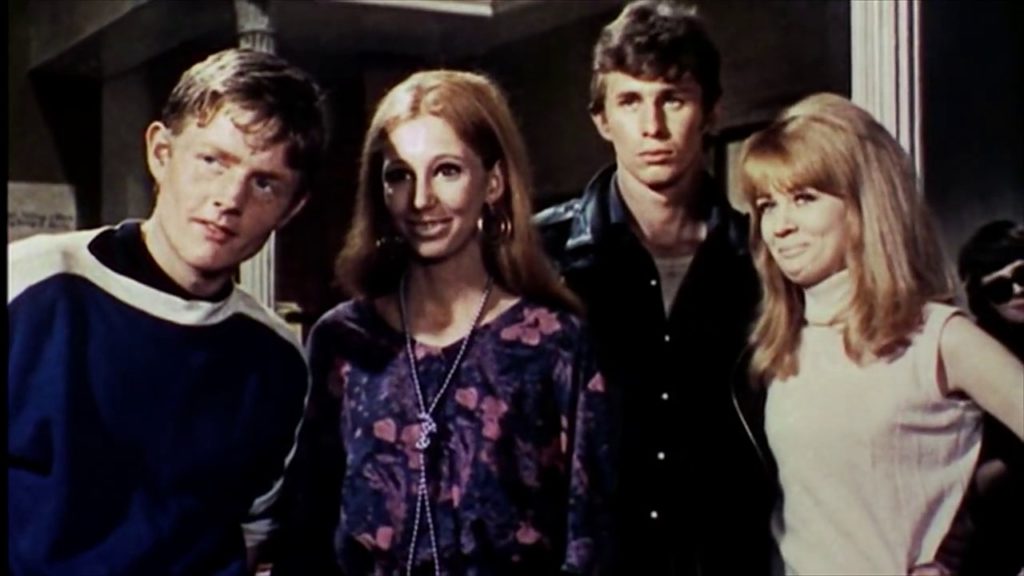
A perennial favourite, this is one of those films that shows how a good teacher can make a difference. In fact, if you look at it closely, To Sir, With Love isn’t just about good teaching; it’s also about growing up, about a coming of age. About the dignity of labour, and about according dignity to people. It’s about how people, when you treat them with respect and dignity, will more often than not, try to show themselves worthy of that respect and dignity.
What I liked about this film:
The overall theme, the story, the acting, everything. All of it comes together to make a memorable and ultimately heart-warming film about human dignity and warmth, resilience and even hope against a backdrop of poverty and sleaze. Thackeray is himself an example of a man who lives in somewhat (relatively) genteel poverty but manages to not let it get him down, to not coarsen him or make him anything but a gentleman—and this is the lesson he endeavours to pass on.
Among the many things good about this film, three in particular stand out for me:
One, the tiny details which help create the entire picture. Not everything, for instance, that Thackeray discovers about his students, comes to him through either his interactions with them or through his conversations with other teachers. Even as he goes to a nearby market to buy oranges, or to just walk through on the way to the bus stop, he passes local people: his student’s parents, for example—and their way of talking, the roughness and sometimes casual racism, gives Thackeray (though he never says it, and it is never explicitly stated) perhaps an idea of why his students are the way they are.
This continues through much of the film, even minor interactions helping put together a more composite picture of why Denham, Dare, Pegg (Barbara ‘Babs’ Pegg, played by Lulu) and Seales are the way they are. Director (and scriptwriter) James Clavell did a brilliant job here.
Then, of course: the main reason for this review, Sidney Poitier as Thackeray. A fine performance, restrained and nuanced and so good. Thackeray tries to be the teacher he thinks the students need: at times unflinching and stoic, at times letting his sense of humour shine through. The guide and mentor, the sensitive father figure—but at the same time, you can see the difficulty even he faces at times. The anger and frustration, the sense of futility. The awkwardness, at times.
And Poitier does it all wonderfully. He is Thackeray.
Last, but not least, the title song. I first heard To sir, with love ages ago, long before I watched the film, and I’ve been in love with it ever since. Lulu’s rendition is fantastic, the way her voice soars, the way it dips and caresses the words… superb.
There’s nothing about this film I didn’t like. It still ranks, despite films like Jagriti and Taare Zameen Par, as a ‘good teacher’ film in a class of its own.
Thank you for the cinema, Mr Poitier.
Madhulika Liddle runs her blog: https://madhulikaliddle.com
Short URL: https://indiandownunder.com.au/?p=17326
